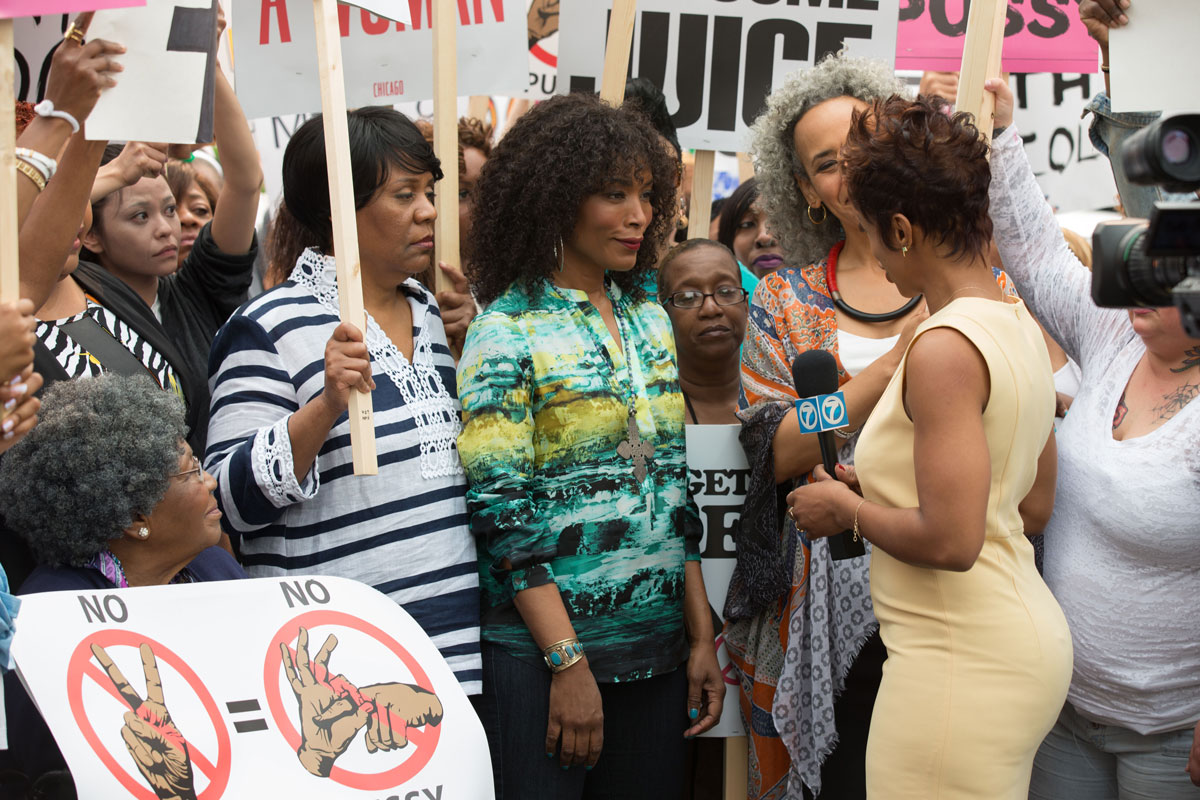One of the many points of tension between Spike Lee and his critics over the movie Chi-Raq was the news that it would be a satire, and the release of the colorful, sometimes comical trailer has reignited that debate. So much so that Lee has responded to the critics of the trailer, in a trailer to the trailer. "There's very humorous moments in the trailer. Now, some people get it twisted," he says, "and think that this is a comedy. Chi-Raq is not a comedy. Chi-Raq is a satire. And there's a difference between humor and comedy."
I was thinking about this last night, because of something the rapper Rhymefest said to the Sun-Times's Miriam DiNunzio.
Rhymefest said the idea of the violence in Chicago being compared to a war — hence the film’s title — angers him perhaps most of all.
"[…] Wars are fought for a reason generally. People fight over land, over money. . . . That’s not what’s happening on Chicago’s South Side . . . . People like to say its gangs fighting over turf. That’s not it. It’s senseless violence."
Which reminded me of something Lee told Chicago's Bryan Smith:
It is possible to address a very serious subject matter and still have humor…. [O]ne of my favorite films, one of my favorite filmmakers: Stanley Kubrick, Dr. Strangelove. What’s more serious than the planet’s destruction? But that movie was hilarious.
Last week I was going around on Twitter with a couple people about what a satire about violence in Chicago would employ as its targets. Predictions like that are a fool's errand, but what else is Twitter for? Will he satirize the gangs? The city's power structure? The collective responsibility—which Mark Konkol wrote eloquently about for DNAInfo in the wake of the murder of Tyshawn Lee—we all have for the century of discrimination and economic violence underlying the city's current problems?
I thought it sounded a lot harder, paradoxically, than the targets of Dr. Strangelove, which New York Times critic Bosley Crowther called "the most shattering sick joke I've ever seen." But maybe it's not actually all that different.
Go back to what Rhymefest said about how violence in Chicago isn't a war, because "wars are fought for a reason generally. People fight over land, money…. People like to say it's gangs fighting over turf. That's not it. It's senseless violence."
Even to the extent that the Cold War was about land or money, Dr. Strangelove isn't about that. It's about mutually assured destruction, the beating heart of the Cold War, such a pure form of violence that it's nearly abstract. It's about fighting fear with fear: the promise that, if something terrible is done to you, it will be repaid with something worse. And it's about the terrifying end of that logic. At a certain point the war becomes not about land or money, but fear. It's completely logical and completely senseless.
And maybe it's more like day-to-day violence than we assume. This is basically what Columbia economists Brendan O'Flaherty and Rajiv Sethi argue in their paper "Homicide in Black and White":
We argue here that this extraordinary concentration of homicides in the black community cannot be fully understood without recognizing that murder is a crime for which there is a powerful preemptive motive: people sometimes kill simply to avoid being killed. This is the case in war, and is also the case in some urban war zones. Ordinary people in ordinary circumstances have little or nothing to gain from killing other people, and high murder rates can generally be sustained only if some people kill for self-protection. The more dangerous the environment in which a person lives, the more likely he is to kill, holding constant his individual attributes. But the level of danger in an environment is itself endogenous, fueled by the extent of perceived danger or fear.
Or as my late friend Lee Sandlin put it, in one of the best essays I've ever read, "Losing the War":
The Vikings … didn't have a word for the prolongation of war long past any rational goal — they just knew that's what always happened. It's the subject of their longest and greatest saga, the Brennu-njalasaga, or The Saga of Njal Burned Alive. The saga describes a trivial feud in backcountry Iceland that keeps escalating for reasons nobody can understand or resolve until it engulfs the whole of northern Europe.
[snip]
For the Vikings, this was the essence of war: it's a mystery that comes out of nowhere and grows for reasons nobody can control, until it shakes the whole world apart. Njal's saga ends with a vision of war as the underlying horror of the world, always waiting underneath the frail mirage of peace.
And that's the gag in Lysistrata: nothing the combatants are killing each other over is so important that they'll sacrifice sex for it. Which means it's certainly not important enough to be killing each other over.
Satire is a farce that throws the illogic of the world into stark relief. Never is that relief more extreme than in the illogic of senseless violence. As long as that persists—and despite the best efforts of satirists, there is no reason to think it won't be with us, somewhere—satire will follow, offering relief, escape, or both.




